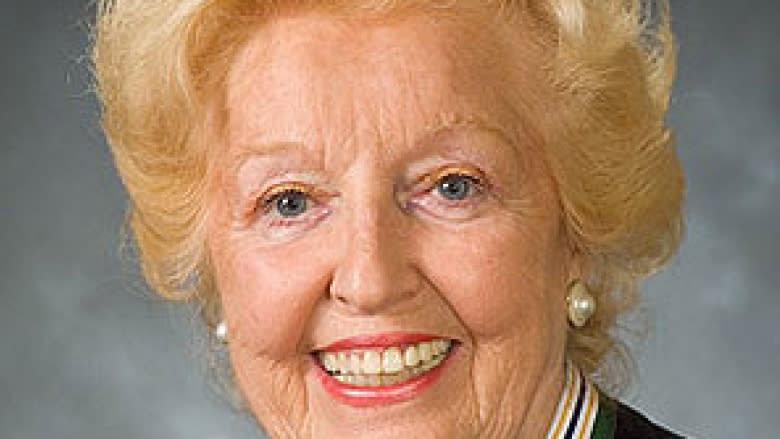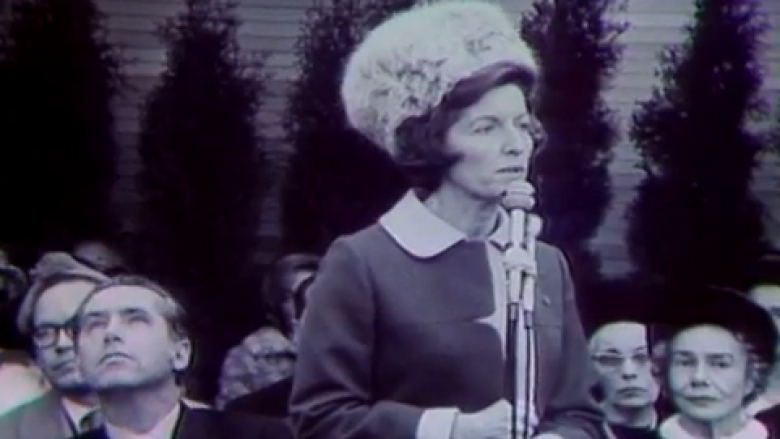Grace McCarthy, influential B.C. cabinet minister for 3 decades, has died at 89
Grace McCarthy, the grand dame of B.C's Social Credit Party, has died at 89.
McCarthy, dubbed "Amazing Grace" by the members of her own party, was a cabinet minister in the governments of all three Social Credit premiers and is credited with revitalizing the party after its first electoral defeat to the NDP in the 1972 provincial election.
But it was her tireless promotion of British Columbia and her high integrity and profile in an era where influential females were uncommon in provincial politics that made her well regarded by both friend and foe.
"Her political career is almost unparalleled in B.C., and her role as a booster of B.C., as a promoter extraordinaire of B.C.," said historian David Mitchell, who has written extensively on the Social Credit Party.
"We have a female premier in B.C. and we may take that for granted, but Christy Clark's emergence may owe something, at least indirectly, to Grace McCarthy's pioneering and breaking the path for female leaders."
McCarthy's former executive assistant Norman Stowe said she died at home, surrounded by members of her family.
"As a province, we've certainly lost somebody who cared for this province a great deal. She has a big legacy. She had a lot to do with how this province was shaped over the last 30 years," he said.
Helped rebuild the Social Credit party
McCarthy was born in 1927 in Vancouver's Grace Hospital, less than a month after it opened. After building a successful flower shop business, she made the leap into politics in the 1950s, serving on the Vancouver Park Board for three terms.
She ran for the Social Credit party and won in the riding of Vancouver-Little Mountain in 1966 and was quickly named to cabinet, where she served for the rest of W.A.C.'s Bennett tenure as premier.
During that time, she successfully persuaded the federal government to introduce a law that allowed unmarried women to apply for mortgages without a male guarantor.
"It didn't seem right to me and when I got into politics I saw the broader picture of very capable women, equal in ability to men, being denied the right to get a mortgage without having a man to back them," she told The Vancouver Sun in 2011.
It was after she and her government went down to defeat in the 1972 election to Dave Barrett and the NDP that she became best known, however.
"People thought Bennett was defeated, and the Social Credit party would go the way of the dinosaur because it was so strongly associated with W.A.C. Bennett," said Mitchell.
"But she took over as president of the party, and went on a campaigning, zealous missionary travel tour throughout B.C., with some others who wanted to try and revive the party."
Three years later, with W.A.C.'s son Bill Bennett as leader, the Social Credit Party defeated the NDP, and McCarthy was re-elected in Little Mountain, where she would serve for another 16 years.
Expo and SkyTrain booster
McCarthy was appointed by Bennett as deputy premier, and it was her experience that helped steady an inexperienced cabinet in its early days.
"She was the person that Bill Bennett relied upon in the very early days to get us all through the trouble that comes to every new cabinet, particularly when you have a lot of rookies, and she was absolutely tireless," said Rafe Mair, who served in the Bennett cabinet before his career as a famed radio broadcaster.
As both tourism minister and the senior cabinet minister from Vancouver, McCarthy did much of the lobbying that resulted in the city receiving the World Exposition in 1986, a landmark event that ushered in Vancouver's modern era.
"Vancouver became the [Expo 86's] home in significant part to Grace Mcarthy's campaigning, locally, nationally and internationally," said Mitchell.
As minister for B.C. Transit, she oversaw construction — and decided upon the name — for the SkyTrain line that was built for Expo. And after negotiating with the Guinness Family, sparkling white lights were installed on the Lions Gate Bridge as a gift for the exposition and have stayed there ever since.
Following the opening of Expo '86, Bennett resigned as premier, and McCarthy was considered a favourite to replace him and become the first female premier in Canadian history.
However, it was the charismatic Bill Vander Zalm who was chosen by delegates instead, and McCarthy resigned from cabinet two years later.
"One of the regrets that many of her friends and supporters have is she never did actually become premier, a role that she seemed to be made for in many respects, but she was denied that opportunity," said Mitchell.
Later career and life
Vander Zalm's premiership was marred by controversy, and after he resigned in 1991 over a conflict of interest scandal, McCarthy again put her name forward to lead the party.
Instead, delegates narrowly chose Rita Johnston as leader, and the party was decimated in that year's provincial election, going from 47 seats in the legislature to seven.
For just the second time in 39 years, the Social Credit Party was out of power in British Columbia — and again, its members turned to McCarthy to rebuild, this time as party leader.
But it was not to be. McCarthy ran in a 1994 byelection in Matsqui but lost by 42 votes to B.C. Liberal candidate (and current finance minister), Mike de Jong.
McCarthy resigned and all but one of the party's remaining MLAs switched affiliations soon afterward, symbolically marking the end of one era of centre-right politics in British Columbia and the official beginning of another.
In retirement, McCarthy started the CH.I.L.D Foundation, which has raised millions in research funds for children suffering from Crohn's disease, ulcerative colitis and liver disorders.
She was appointed to the Order of British Columbia in 2004.
Stowe said reminders of McCarthy's legacy are almost impossible to miss.
"If you remember Expo 86, that was Grace McCarthy. If you remember the name Skytrain, that was Grace McCarthy. And if you drive across the Lions Gate Bridge and look at those lights on the bridge at night, that was Grace McCarthy."
"She touched a lot of things in this province, particularly in the Lower Mainland, and she was a very, very proud British Columbian."
With files from Richard Zussman and Michelle Ghoussoub




